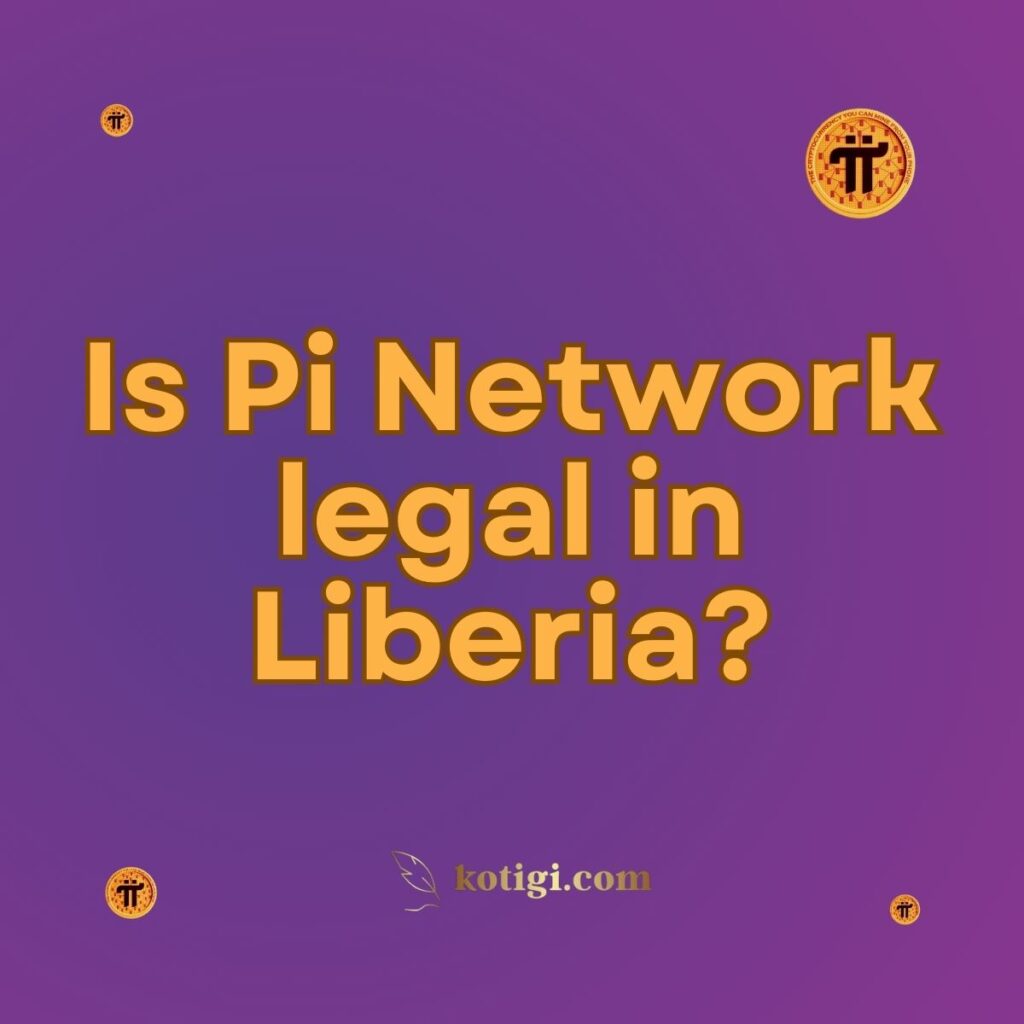
Is Pi Network legal in Liberia?
Pi Network is currently legal in Liberia, as the country does not have specific regulations prohibiting cryptocurrency use. However, like many other developing nations, Liberia lacks a formal regulatory framework for digital assets, so participants should proceed with caution and stay informed about potential future regulations.
Introduction
As cryptocurrency adoption continues to grow worldwide, more users in Liberia are exploring platforms like Pi Network. While Liberia has not yet established specific regulations for cryptocurrencies, the platform is not illegal. In this article, we’ll explore the current legal landscape for Pi Network in Liberia, the potential risks for participants, and what users should consider before engaging with the platform.
Cryptocurrency Landscape in Liberia
Lack of Specific Cryptocurrency Regulations
Liberia, like many developing nations, has not yet implemented a formal legal framework for cryptocurrencies. The country’s financial regulations have not specifically addressed digital assets such as Pi Network, Bitcoin, or Ethereum. This means that, for now, users can participate in Pi Network without the risk of legal repercussions. However, the absence of regulation also means there is limited consumer protection, leaving users exposed to the volatility and risks associated with the cryptocurrency market.
Government Stance on Cryptocurrencies
Although the Liberian government has not issued specific statements about Pi Network, it has expressed interest in exploring blockchain technology and its potential uses for the country’s economy. Some government officials have shown openness toward digital financial systems, recognizing their potential to drive economic growth and financial inclusion. Despite this openness, no formal policies or legal frameworks have been put in place to regulate cryptocurrency platforms like Pi Network.
Liberians interested in Pi Network should stay alert to any government announcements regarding digital assets, as future regulations may impact the platform’s legality and operation within the country.
Potential Risks for Pi Network Users in Liberia
Unregulated Market Risks
Since Liberia lacks formal regulations for cryptocurrencies, Pi Network operates in a legal grey area. This unregulated status poses risks to participants, particularly regarding consumer protection and fraud. While Pi Network aims to create a secure and decentralized ecosystem, the platform is still in its closed mainnet phase, and the lack of regulation in Liberia means there is little recourse for users if they encounter issues with their accounts or Pi coins.
Future Regulatory Developments
As cryptocurrencies gain traction globally, there is a possibility that Liberia will develop regulations to govern the use of digital assets. Future laws could either facilitate or restrict platforms like Pi Network, depending on how the government chooses to regulate the market. Users should stay informed about any policy changes that may affect their ability to participate in Pi Network and other blockchain-based platforms.
The Role of Pi Network in Liberia’s Financial Ecosystem
Financial Inclusion Opportunities
One of Pi Network’s key appeals in Liberia is its potential to promote financial inclusion. Many Liberians lack access to traditional banking services, and Pi Network’s mobile mining model offers an alternative way for people to participate in the global financial system. By allowing users to mine Pi coins on their smartphones without needing expensive hardware, Pi Network can engage a broader segment of the population, particularly those in underserved or rural areas.
This aligns with the broader goals of financial inclusion and digital innovation that many African countries, including Liberia, are striving to achieve.
Pi Network’s Future Potential in Liberia
As Pi Network transitions to its open mainnet and Pi coins become tradeable, there could be opportunities for Liberians to use the platform for everyday transactions, cross-border payments, or even business ventures. However, these possibilities depend on future developments in Liberia’s cryptocurrency regulations. For now, Pi Network remains a platform for building community and mining coins with no real-world value until the mainnet phase is fully launched.
Consumer Protection and Security Concerns
Absence of Legal Protections
Given the lack of cryptocurrency regulations in Liberia, Pi Network users have limited legal protections. Unlike in more regulated markets, where users might have recourse in the event of fraud or mismanagement, Liberian participants are vulnerable to potential risks. Until the government establishes clear guidelines, Pi Network users should proceed with caution, ensuring they understand the risks associated with using an unregulated cryptocurrency platform.
Security Considerations for Users
Although Pi Network’s model of mobile mining and community validation is designed to be secure, users should remain vigilant about protecting their accounts and data. With no formal consumer protection laws in place, any security breaches or losses may be difficult to resolve. Users should take standard security precautions, such as enabling two-factor authentication (2FA) and avoiding sharing personal information or account details with untrusted parties.
Potential Economic Impact of Pi Network in Liberia
Blockchain and Economic Growth
Cryptocurrencies like Pi Network could play a role in Liberia’s future economic development. By leveraging blockchain technology, Liberia has the potential to modernize its financial infrastructure and introduce new opportunities for entrepreneurship and digital innovation. While the country is still in the early stages of exploring blockchain, platforms like Pi Network can help lay the groundwork for a more digital-focused economy.
Pi Network as a Tool for Remittances
Liberians often rely on remittances from family members abroad. Cryptocurrencies, including Pi Network, could provide a low-cost alternative for sending and receiving money across borders. By eliminating intermediaries and reducing transaction fees, Pi Network could become a valuable tool for cross-border payments once its Pi coins are fully tradeable.
However, the success of Pi Network in this context will depend on its future adoption and whether Liberia enacts favorable regulations for cryptocurrency use.
Conclusion
While Pi Network is legal in Liberia, the country’s lack of specific cryptocurrency regulations places users in a legal grey area. The platform can be used without restriction, but participants should be aware of the risks associated with engaging in an unregulated market. As Liberia’s government continues to explore the potential of blockchain technology, future regulations could impact the operation of Pi Network and other cryptocurrency platforms.
For now, Pi Network presents an opportunity for financial inclusion and economic innovation, particularly in underserved communities. However, users must remain cautious and informed about potential regulatory developments and the security risks involved in using an unregulated cryptocurrency platform.
Key Takeaways
- Legal Status: Pi Network is legal in Liberia, but the country lacks formal cryptocurrency regulations.
- Government Stance: Liberia has not issued specific guidelines for cryptocurrencies but has shown interest in exploring blockchain technology.
- Financial Inclusion: Pi Network’s mobile mining model offers an opportunity for broader financial inclusion in Liberia.
- Regulatory Risks: Users should stay informed about potential future regulations that could impact Pi Network’s legality and operation in Liberia.
- Consumer Protections: Due to the absence of formal cryptocurrency laws, Pi Network users in Liberia have limited legal recourse in the event of fraud or security issues.




